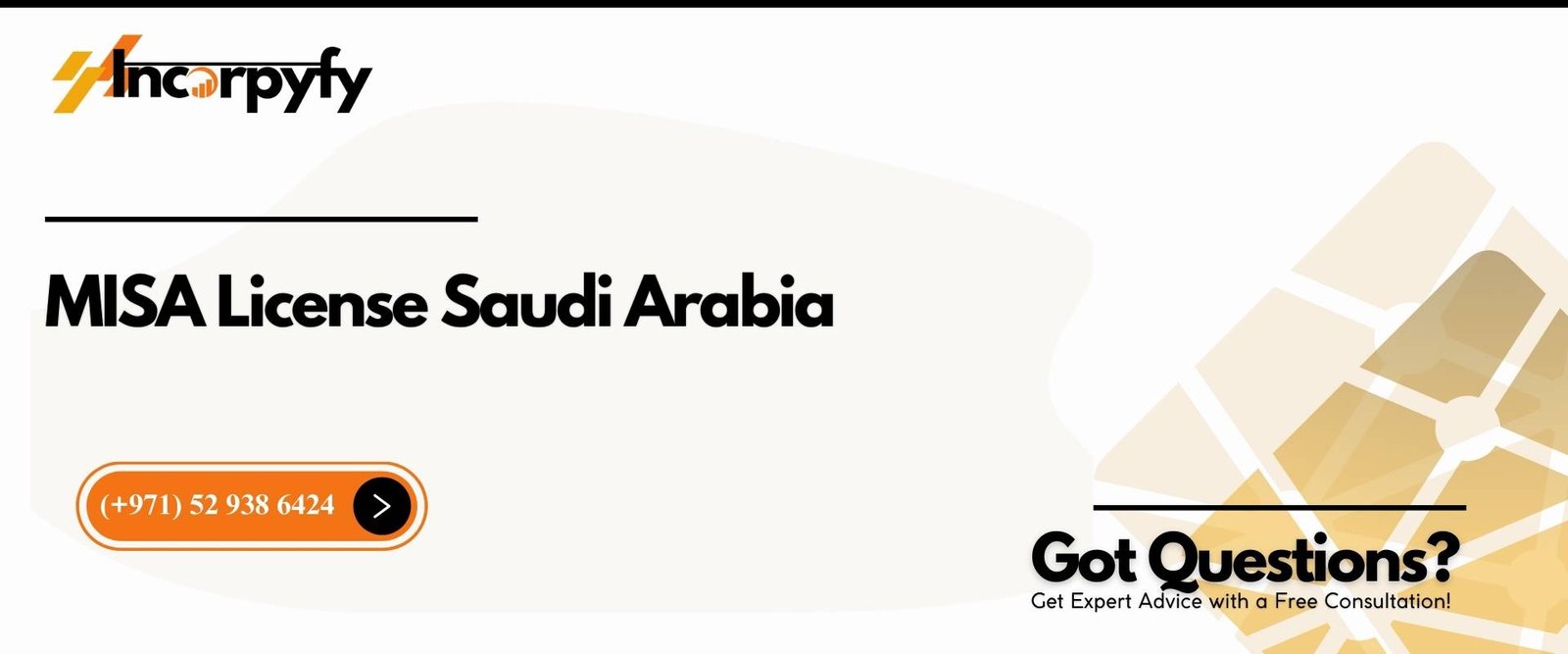
Saudi Arabia’s economy continues to transform under Vision 2030, and the MISA License plays a central role in welcoming foreign investment in 2025. Officially issued by the Ministry of Investment of Saudi Arabia (MISA), this license opened doors for international companies aiming to establish a lawful, compliant presence within the Kingdom.
What Is the MISA License?
The MISA License, also known as the Foreign Investment License, is a legal permit allowing foreign-owned companies to set up and operate in Saudi Arabia. It replaced SAGIA’s authorization and grants the licensee full access to the Kingdom’s economy and regulatory support.
Key aspects include:
- Full foreign ownership (no local partner required in many sectors)
- Entry into Saudi’s local market
- Right to employ local and expatriate staff
- Eligibility for incentives and special economic zone benefits
- Legal protection under Saudi investment laws and safeguards
In 2025, the license is essential for foreign investors seeking a smooth, structured route into different Saudi sectors.
History & Evolution
The MISA License originated as part of Saudi Arabia’s effort to attract foreign investment and diversify its economy. Over the years, it has evolved with reforms under Vision 2030, replacing older licensing systems and streamlining the process to make it easier for international businesses to operate within the Kingdom.
Early Years
The licensing framework began in the early 2000s to attract foreign capital and reduce reliance on oil, before formalizing under SAGIA.
Vision 2030 Era
Under initiatives like NEOM and the Red Sea Project, licensing expanded drastically. By 2025, MISA grants access to advanced industries in tourism, tech, renewables, manufacturing, healthcare, education, infrastructure, and logistics.
The license now reflects Saudi Arabia’s new identity: dynamic, diversified, open to global business.
Why the MISA License Is Critical
The MISA License is essential for any foreign company wanting to operate legally in Saudi Arabia. It ensures compliance with national laws, provides market access, and protects investor rights. Without this license, businesses cannot register, hire staff, or access the many government incentives available for international investors in the Kingdom.
Legal Status & Regulatory Approval
Foreign investors cannot legally operate in the Kingdom without MISA approval. It’s the first necessary step to register with the Ministry of Commerce, customs, banking, taxation systems, and more.
Access to Incentives
MISA license holders may access:
- Tax holidays for up to 5 years
- Exemptions from customs duties
- Access to industrial zones and special economic areas
- Support for import/export financing and government contracts
These benefits are vital for improved ROI and competitive positioning.
Protecting Investments
MISA status protects foreign investment, allowing arbitration under international treaties and assuring businesses that legal recourse and safeguards exist.
Ease of Operations
Once licensed, foreign investors can open bank accounts, hire staff, rent property, and conduct trade in full compliance with regulations.
Saudi Arabia’s 2025 Economic Landscape
Saudi Arabia’s economy is rapidly evolving, driven by Vision 2030’s push into sectors like renewable energy, digital technology, healthcare, tourism, and logistics. Strategic mega-projects and industrial zones are opening vast opportunities. With supportive policies and infrastructure growth, this landscape offers attractive potential for foreign investors and international partners.
GDP & Growth
Following a projected 3.8% GDP growth in 2024, Saudi Arabia has continued to diversify. In 2025, tech, tourism, healthcare, and logistics are key engines, supported by smart infrastructure and industrial zones.
Mega-Projects & Opportunities
- NEOM: a center for advanced industries
- Red Sea Project: climate-integrated tourism
- Expansion of industrial cities like Jazan and King Abdullah Economic City drives demand across industries—from hospitality to energy.
Improved Business Environment
Saudi Arabia ranks highly on ease of doing business, with digital licensing, fast-track approvals, and government portals simplifying entry and compliance.
How to Obtain a MISA License in 2025
To obtain a MISA License, you must determine your legal structure (e.g., LLC, branch), prepare your documents (business plan, financials, capital proof), and apply via the MISA investor portal. Pay the application fee (around SAR 7,500), wait through the evaluation process, and, once approved, commence full operations.
Legal Structure & Eligibility
Choose between:
- Limited Liability Company (LLC)
- Branch Office
- Representative Office
- For specialized sectors, structures like Joint Ventures, Holding Companies, or Free Zone setups may apply.
Prepare Required Documents
Document checklist includes:
- Company Articles of Association
- Shareholder details (passports, IDs)
- Business plan & financial projections
- Bank statements and proof of minimum capital
- Local address or lease (if needed)
Online Application via MISA Portal
Applications go through the MISA Investor Portal. Applicants select activities that map to MISA’s priority industries and secure an entity digital profile.
Fee Payment
Basic fee around SAR 7,500 (~$2,000), depending on entity type and capital.
MISA Evaluation
MISA reviews:
- Business activity alignment with Vision 2030
- Qualification and capital adequacy
- Potential economic impact
Expect 4–8 weeks for approval.
Issuance of License & Additional Approvals
Post‑approval:
- Obtain MISA License certification
- Apply for municipal/business registrations
- Get specialized permits (e.g. MOH, Ministry of Transport)
Establishing Operations
Register at the Ministry of Commerce, get access to payroll systems, open a bank account, rent or build facilities, and hire workforce.
Benefits of MISA Licensing
The MISA License offers foreign investors full ownership rights, legal protection, and access to Saudi Arabia’s growing markets. It enables easier company registration, eligibility for government incentives, and participation in major projects like Vision 2030. Businesses also gain credibility and the ability to operate across diverse sectors with official recognition.
Market Access
Foreign businesses can access millions of local consumers.
Government Contracts
Eligibility for awarding in national infrastructure and Riyadh Development Fund projects.
Incentive Packages
Tax breaks, customs exemptions, and location advantages (e.g. NEOM, Ras Al-Khair).
JV Opportunities
Easy partnership with Saudi firms.
Long-Term Legitimacy
License includes legal protection under Saudi and international law.
Cost & Investment Requirements
- Minimum Capital: SAR 500,000–30,000,000 (depending on scope and sector)
- Application Fee: SAR 7,500
- Consultant Fees: Typically SAR 15,000–75,000
- Visa, Bank, Approvals: SAR 10,000–50,000
- Annual Renewal & Activity Fees: SAR 5,000–20,000
Expect initial setup costs of SAR 600,000+ with scaling driven by sector and infrastructure needs.
Challenges & Considerations
While the MISA License opens doors for foreign investors, challenges remain. These include navigating local regulations, understanding cultural differences, and meeting Saudization requirements. Investors must also stay updated with policy changes and ensure full compliance. Proper planning and local guidance are essential to avoid delays and ensure a smooth business setup.
Regulatory Compliance
Maintain corporate governance, regulated filings, Saudisation targets, and sector-specific certifications.
Talent Acquisition
Comply with Saudisation while attracting international talent.
Infrastructure and Logistics
Some areas still require logistics investment (e.g. northern regions).
Cost & Currency Risk
Macro shifts—including inflation or policy changes—should factor into forecasts.
Cultural Differences
Local partnerships, norms, and stakeholder relations are vital. Advisors with local insight can be critical.
MISA License and Sustainability
Saudi Arabia now prioritizes green industries and renewables. In 2025, MISA licensing incentives include:
- Carbon-neutral incentives
- Renewable energy projects
- Sustainable construction methods
Foreign investments in ESG-compliant activities receive additional support.
Sectors in Focus for 2025
In 2025, Saudi Arabia is prioritizing sectors like renewable energy, healthcare, tourism, technology, and logistics. These industries align with Vision 2030 goals and offer lucrative opportunities for foreign investors. Businesses in these areas benefit from strong government support, incentives, and fast-track licensing through the MISA License framework.
Renewable Energy & Sustainability
Wind, solar, and sustainable solutions are priorities.
Digital & Tech Innovation
AI, fintech, e-commerce, logistics tech, cloud services
Tourism & Hospitality
Eco-resorts, entertainment, and cultural tourism.
Healthcare & Life Sciences
Medical tech, biotech R&D, pharmaceuticals.
Manufacturing & Advanced Industries
Automotive, aerospace, advanced assembly.
Education & Human Capital
EdTech, vocational training, university partnerships.
Industry-Specific Licensing Requirements
Depending on activity, additional approvals may come from:
- Ministry of Health (MOH)
- SFDA for food/beverage/pharma
- CRPZA for tourism
- Ministry of Culture for entertainment
Each industry has compliance timelines, mandatory inspections, and reporting obligations.
Compliance & Reporting Post-Launch
After setup:
- Annual license renewals
- Annual audited financials
- Labor Saudisation reports
- Corporate tax filings (9% on profits above SAR 375,000)
- ESG metrics (for public or special zone companies)
Staying compliant preserves reputation and prevents penalties.
Why Professional Help Matters in 2025
Specialized consultants/ law firms can:
- Define optimal entity structure
- Prepare documentation
- Translate and legalize papers
- Streamline approvals
- Guide recruitment in line with Saudisation
- Support expansion or compliance
Their support reduces costs, risk, and frustration.
Common Timelines
| Step | Typical Time Frame |
| Submission | Day 1 |
| MISA Review | 4–8 weeks |
| Issuance of License | +1 week |
| Trade Registration + Bank Setup | 1–3 weeks |
| Staff Hiring + Office Setup | Ongoing |
| First Review or Inspection | Within 1 year |
Delays may occur if documents are missing or clarifications are requested.
Expansion & Growth Steps
With the license and first office in place:
- Scalable recruitment
- Export/import definitions
- Partnerships or M&A
- Initiate sector-specific projects (e.g. NEOM bids)
- Renew license annually, maintain Saudisation and reporting
MISA License vs Free Zone Setup
- Free zones allow 100% ownership and fast licensing but limit local trade.
- MISA License lets foreign companies fully serve the local market and bid for public contracts. Free zone entities usually require local representation to sell in mainland Saudi.
Future Outlook & Opportunities
- Growth in green industries
- Demand for digital transformation
- Explosion in tourism, hospitality, recreation
- Unlocking gas-based chemicals and manufacturing
- Expansion in healthtech and life sciences
- Rise of edtech and e-learning
These sectors align directly with MISA-eligible industries, offering prime opportunity targets for 2025 entrants.
Conclusion
The MISA License in Saudi Arabia is your gateway into one of the fastest transforming investment landscapes of the 2020s. It offers legal legitimacy, incentivized pathways, local market access, and strategic placement in national growth plans.
While the process involves documentation, compliance, Saudisation, and sector-specific hurdles, these are manageable when paired with clarity and professional guidance.
Whether you’re entering tech, renewables, tourism, healthcare, or manufacturing—with the MISA License, you have the foundation to launch and scale successfully in 2025 and beyond.
Who can apply?
Foreign entrepreneurs and companies—subject to capital, sector, and compliance requirements.
How long is processing?
4–8 weeks for approval; setup adds 2–4 more weeks.
Can I own 100%?
Yes, in most sectors including priority Vision 2030 industries.
What are minimum capital thresholds?
Typically SAR 500,000 to SAR 30 million depending on your business activity.
Do I need local sponsorship?
No—MISA now allows 100% foreign ownership without a local sponsor.
What fees apply after approval?
Annual license renewals, Saudisation compliance, corporate tax filings as needed.
Are foreign consultants required?
Professional help is highly recommended—for efficiency, compliance, and strategic setup.






